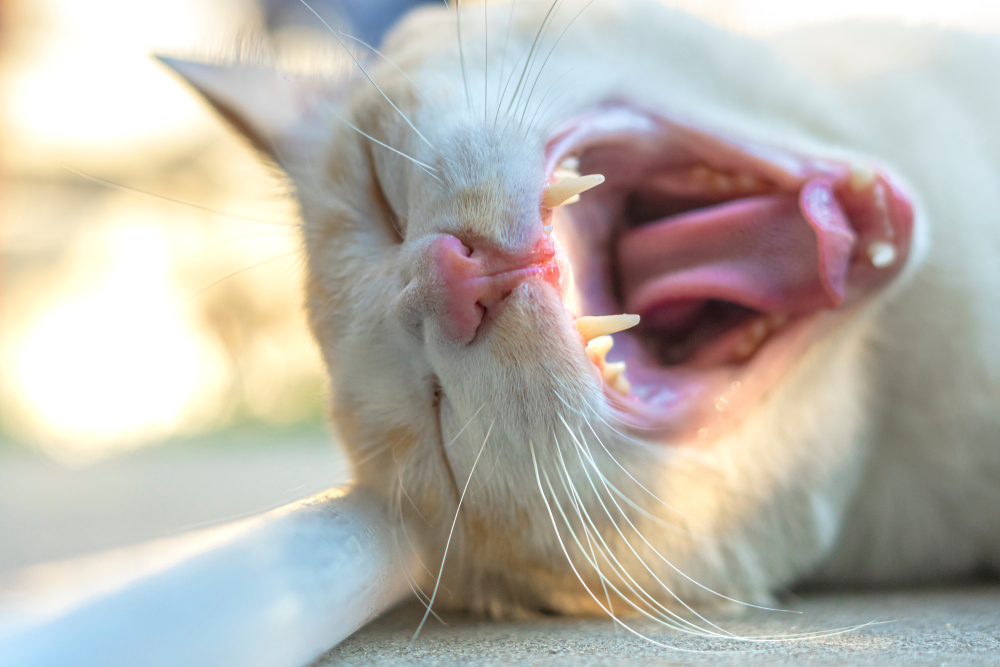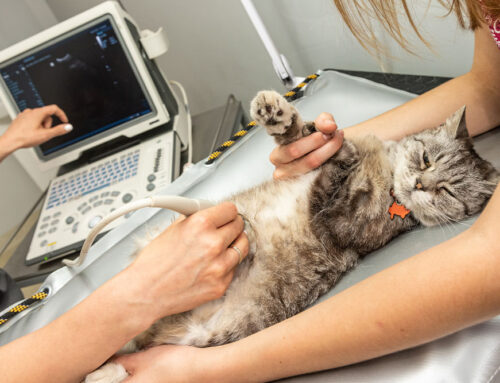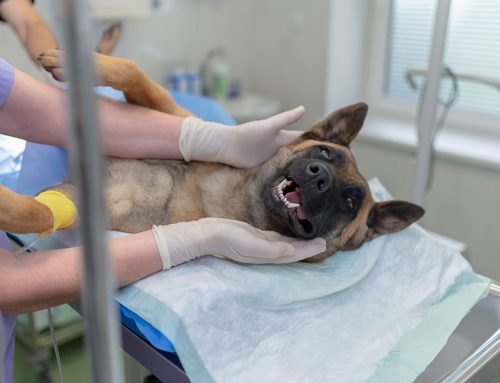Pets are skilled at hiding illness and pain, and determining if they need veterinary care can be difficult. In addition, you may be unsure if the signs you see indicate your pet needs emergency care, a regularly scheduled veterinary visit, or at-home care. Read our Burlington Veterinary Center team’s guide to help determine what signs warrant a veterinary exam and what kind of care your four-legged friend needs.
Signs that indicate your pet needs emergency veterinary care
If your pet experiences an emergency, they need veterinary care as soon as possible. Signs that warrant an emergency veterinary visit include:
- Significant trauma — If your pet is hit by a car, has fallen from a significant height, or was attacked by another animal, they could have internal injuries, so even if they seem OK, they should be evaluated as soon as possible by a veterinarian.
- Toxin ingestion — Many foods and household items are toxic to pets, and if your pet ingests a toxin, they can experience life-threatening consequences. If you know or suspect your pet has ingested a toxin, immediately call Animal Poison Control and then head to the nearest emergency veterinary hospital.
- Excessive bleeding — If your pet loses too much blood, they can go into shock and potentially die. If your pet is bleeding excessively or their bleeding doesn’t stop after five minutes, continue to apply pressure to the wound and seek immediate veterinary care.
- Persistent gastrointestinal (GI) upset — Pets commonly vomit and have bouts of diarrhea without any negative repercussions, but cases that require emergency veterinary care include if you know or suspect your pet has ingested a toxin or foreign body, if your pet is experiencing signs including abdominal pain or distention, fever, lethargy, or lack of appetite, or if your pet’s vomit or diarrhea contains blood.
- Significant pain — If your pet is in significant pain, they need emergency veterinary care to provide relief. Signs include vocalizing, shaking, refusing to move, refusing to bear weight on a limb, and not eating.
- Difficulty breathing — Breathing difficulties can indicate conditions such as a respiratory infection, asthma, heart condition, and anemia. Signs include excessive panting, open-mouthed breathing, exaggerated abdominal movement during breathing, and blue or purple mucous membranes.
- Heatstroke — Heatstroke is a veterinary emergency that can lead to potentially life-threatening consequences. Signs include excessive panting, thick, ropey drool, lethargy, red mucous membranes, diarrhea, and collapse.
- Corneal injury — Corneal injuries can progress quickly and threaten your pet’s vision. Signs include tearing, eye redness or swelling, excessive blinking, holding the eye closed, and rubbing the eye.
Signs that indicate your pet needs a regularly scheduled veterinary visit

While you want your pet’s health problems addressed as soon as possible, not every issue is an emergency. Signs that warrant a regularly scheduled veterinary visit include:
- Change in eating and drinking habits — Decreases in your pet’s appetite and water intake can indicate issues such as illness, pain, and stress. In addition, increases in your pet’s hunger and thirst can indicate health problems such as diabetes, hyperthyroidism, and Cushing’s disease.
- Bad breath — Bad breath typically indicates your pet has dental disease, which is a serious condition that can lead to painful, swollen gums, loose and missing teeth, tooth root abscesses, and injury to your pet’s kidneys, liver, and heart. If your pet has exceptionally stinky breath, contact our Burlington Veterinary Center team to schedule a professional veterinary dental cleaning.
- Limp — If your pet favors a limb, but is otherwise acting normally (e.g., bright, alert, and eating), you can schedule a regular veterinary appointment. In the interim, prevent your pet from being too active and ice the affected area to help reduce inflammation. Avoid giving your pet human pain relief medication, which may be toxic to your four-legged friend.
- Stiffness — Arthritis is a common condition in pets that often goes unrecognized and untreated. Signs include stiffness (especially after resting), reduced activity, hesitation when jumping on or off elevated surfaces, awkwardness when navigating stairs, and resting in odd positions. Diagnosing the problem allows our team to develop a treatment plan to help alleviate your pet’s joint pain and improve their quality of life.
- Eliminating outside the litter box — If your cat suddenly refuses to use their litter box, schedule a veterinary appointment. Issues such as kidney disease, arthritis, urinary tract infection, and feline idiopathic cystitis can cause inappropriate elimination and should be evaluated by a veterinarian.
- Itchy skin — Many pets develop allergies such as flea-bite hypersensitivity, atopy (i.e., environmental allergies), and food allergies. If not properly addressed, these issues can cause serious health effects, including skin wounds from scratching, skin infections, and chronic or recurrent ear infections.
- Obesity — The majority of pets are overweight, putting them at higher risk for health complications such as diabetes, arthritis, cancer, hypertension, and urinary tract disease. If your four-legged friend has a few extra pounds to lose, contact our team so we can help devise a safe weight loss strategy. Attempting to place your pet on a diet without veterinary advice can lead to consequences such as malnutrition and hepatic lipidosis, a potentially life-threatening liver disease.
- Behavioral changes — Any change in your pet’s behavior can indicate a health problem. For example, if your usually social cat starts hiding most of the day, an illness, such as kidney disease, could be to blame; if your normally friendly dachshund snaps at you when you pet them, they may have back pain; if your typically self-assured Australian heeler suddenly becomes clingy, they may be affected by cognitive dysfunction. Any behavioral change should be investigated by a veterinarian.
While these signs indicate your pet needs veterinary attention, the best way to keep them happy and healthy is to schedule regular wellness examinations to detect conditions before they cause a problem. Contact our Burlington Veterinary Center team today to make your pet’s appointment.







Leave A Comment